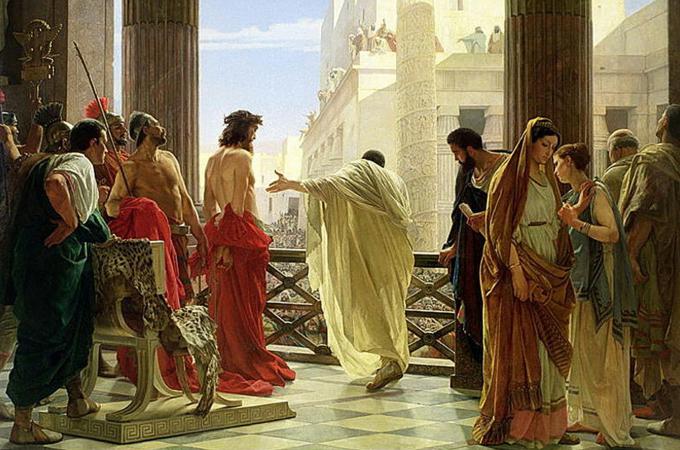Who killed Jesus?
Recently, some Catholic Memorial high-school students embarrassed themselves and their school by chanting "You Killed Jesus" at a basketball game in Newton, the largely Jewish community where I live. This was in response to taunting from Newton North about the Catholic all-male school ("Where are the girls?" etc.) The administration of Catholic Memorial, and the students involved, promptly and rightly apologized for the anti-Semitic slur.
At this time of commemorating Good Friday, it is good to recall what Vatican II formally declared more than 50 years ago, "Neither all Jews indiscriminately at that time, nor Jews today, can be charged with the crimes committed during Christ's passion." This should be obvious to anyone by now. Guilt by association is just not fair.
But more fundamentally, and at a deeper spiritual level, the Catechism of the Catholic Church reiterates what the Catechism of the Council of Trent had said in the 16th century: "Since our sins made the Lord Christ suffer the torment of the cross, those who plunge themselves into disorders and crimes crucify the Son of God anew in their hearts (for he is in them) and hold him up to contempt. And it can be said that our crime in this case is greater in us than in the Jews. As for them, according to the witness of the Apostle, 'None of the rulers of this age understood this, for if they had, they would not have crucified the Lord of glory.' We, however, profess to know him." In this Year of Mercy, it is fitting to remember one of Jesus' last utterances, "Father, forgive them, for they know not what they do." All too often, by contrast, we do know, or at least sense, the evil that we do.
The Catechism promulgated by St. John Paul II almost 25 years ago goes on to quote St. Francis of Assisi, who said, "Nor did demons crucify him; it is you who have crucified him and crucify him still, when you delight in your vices and sins."
And so the proper answer to the question of who killed Jesus is, "I did"-- because of my sins. Maybe you did, too, but "Judge not, that you may not be judged." In any case, it doesn't seem a proper subject for sports trash-talk, only for examining one's own conscience with becoming humility and, hopefully, repentance.
Which brings me to my second sobering reflection this Holy Week. Secretary of State John Kerry just declared that ISIS, the self-proclaimed Islamic State, is engaging in genocide of Christians and other religious groups like the Yazidis and Shiite Muslims. This bloody persecution and modern martyrdom is finally being recognized for what it is, and hopefully the international community, in conjunction with the United States, can act forcefully to put a stop to it. If Saul, the future Apostle Paul, was prostrated by hearing Christ ask, "Saul, Saul, why are you persecuting me?," when he was persecuting early Christians, and Jesus himself said, in the Gospel according to Matthew, "Whatever you do to these, the least of my brethren, you do to me," then there is a deep identity between Christ and his followers.
And so, we can probably conclude that ISIS is killing Christ anew in the Middle East. The good news is that we now have many contemporary examples of Christian witness, and, as Tertullian said, "The blood of the martyrs is the seed" of the Church. The bad news is that it's mass murder, often by beheading. What are we, and what am I, going to do about it?
DWIGHT G. DUNCAN IS A PROFESSOR OF CONSTITUTIONAL LAW AT UMASS SCHOOL OF LAW DARTMOUTH.
- Dwight G. Duncan is professor at UMass School of Law Dartmouth. He holds degrees in both civil and canon law.



















